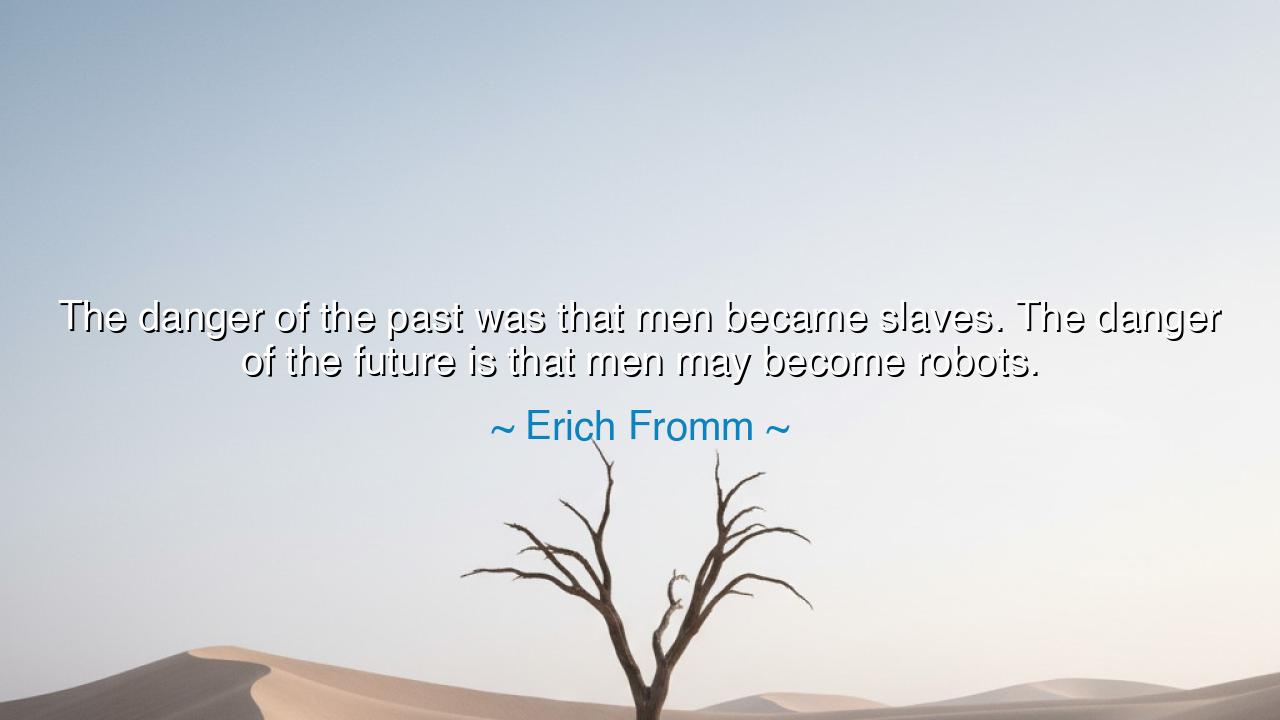
The danger of the past was that men became slaves. The danger of
The danger of the past was that men became slaves. The danger of the future is that men may become robots.






"The danger of the past was that men became slaves. The danger of the future is that men may become robots." – Erich Fromm.
In these profound words, Erich Fromm speaks to the contrasting dangers humanity faces in two different epochs: the danger of slavery in the past and the looming threat of mechanization in the future. Fromm reminds us that history’s darkest moments were marked by human beings losing their freedom, either through literal slavery or oppressive societal structures. However, he warns that the future might present a different, more insidious threat—one where people do not lose their freedom through force or coercion but through compliance and the loss of their humanity in the face of technology and automation. The past enslaved men with chains; the future may enslave them with the dull, automated rhythms of a mechanized existence.
The ancient philosophers understood that freedom is central to human dignity. Socrates, perhaps the greatest of them all, valued freedom of thought and the ability to question the world around him. He knew that without the ability to think critically and make independent choices, a person ceases to be fully human. In the past, slavery meant the literal loss of freedom and the subjugation of one’s will to the power of another. Yet even in those times, philosophers like Socrates sought to illuminate the human capacity for reason and self-determination. Fromm’s warning reflects this ancient wisdom: we are not truly free if our thoughts, our actions, and our lives are dictated by forces beyond our control.
Consider the story of Spartacus, the leader of the great slave revolt in ancient Rome. Spartacus and his fellow slaves fought not only for their physical freedom but for their human dignity. They understood that being enslaved was not just about being forced to labor, but about being stripped of their ability to make choices, to live in accordance with their own desires and values. Their fight was a fight for the freedom of the spirit, for the right to be more than tools of the state. Fromm’s words echo this struggle: the danger of the past, as seen through the suffering of slaves like Spartacus, was the physical and mental imprisonment of the individual.
However, Fromm does not suggest that freedom is solely a matter of liberation from physical chains. He warns that the future might present a subtler, more insidious form of enslavement: the robotic existence. As society becomes more dependent on technology and automation, Fromm feared that people would lose their individuality and autonomy, not through external coercion but through their passive acceptance of mechanized systems that dictate every aspect of their lives. The industrial revolution, for example, introduced machines that allowed humans to perform tasks more efficiently, but it also led to dehumanizing labor in factories where workers became mere cogs in a vast, impersonal machine. In this sense, Fromm’s warning speaks to the growing danger of being reduced to automatons, where human creativity, freedom, and self-expression are replaced by routine, efficiency, and predictability.
The rise of automation and artificial intelligence today has brought these concerns into sharp focus. In a world where technology seems to offer endless convenience, we must ask ourselves: are we becoming slaves to our devices, our routines, and the technologies that are meant to serve us? Are we losing our ability to think for ourselves, to create, and to imagine new possibilities, as we become increasingly dependent on machines to make decisions for us? Siri, Alexa, and other artificial systems are designed to make our lives easier, but at what cost to our free will? Are we giving up a portion of our humanity in exchange for comfort and efficiency? Fromm’s warning resonates more deeply today than ever: we must guard against allowing ourselves to become robots—without thought, without soul, without the essence of what makes us human.
The lesson that Fromm’s quote imparts is a call to balance: while we must embrace the advantages of technology and progress, we must also ensure that we do not lose our human essence in the process. The future holds great potential for both advancement and alienation, and the path we choose depends on how we use the tools we create. Like the ancient philosophers, we must constantly question whether the systems we build serve our humanity or whether they undermine it. The key is to engage with technology thoughtfully, not blindly, to ensure that we maintain our freedom, creativity, and capacity for independent thought.
In our own lives, we must strive to be conscious of the role technology plays and avoid becoming passive participants in a world that could easily turn us into mere functionaries. Just as the ancients warned against the loss of personal freedom through physical or intellectual oppression, we must guard against losing ourselves in the machinery of modern life. Let us ensure that our lives are not defined by the routines that technology creates but by the choices we make, the values we hold, and the creativity we foster. In doing so, we can ensure that we remain truly free—masters of our own destiny, not robots bound by the systems we have created.






AAdministratorAdministrator
Welcome, honored guests. Please leave a comment, we will respond soon